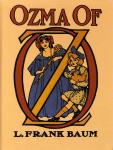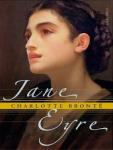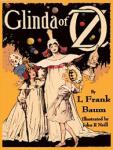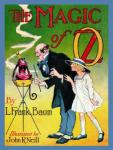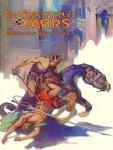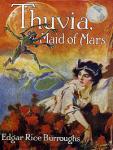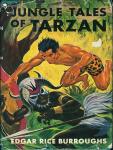Under The Lilacs
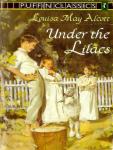
Under the Lilacs is a children's novel by Louisa May Alcott, first published in 1878. The story is about two girls; Bab and Betty Moss; Miss Celia; a circus runaway, Ben Brown; and his dog Sancho.When Bab and Betty decide to have a tea party with their dolls a mysterious dog comes and steals their prized cake. The girls find a circus run-away, Ben Brown, hiding in their play barn. Ben is a horse master, so when the Mosses take the Ben in they find him work at a neighbor's house driving cows.Eventually Ben finds out his beloved father is dead. Miss Celia, a neighbor, comforts him and finally offers to let Ben stay with her and her fourteen-year-old brother Thornton.Many adventures and summer-happenings go on in Celia's house, as Ben slowly finds his place among his friends. Sancho gets lost, Ben is accused of stealing, Miss Celia gets hurt and Ben takes a wild ride on her horse, Lita. They have an archery competition, where Ben emerges as the hero. But a pleasant surprise is waiting for Ben in the end, and the story is an altogether heart - rendering tale of friendship and adventure, by celebrated authoress, Louisa May Alcott.
Contents
- Chapter 1 - A Mysterious Dog
- Chapter 2 - Where They Found His Master
- Chapter 3 - Ben
- Chapter 4 - His Story
- Chapter 5 - Ben Gets A Place
- Chapter 6 - A Circulating Library
- Chapter 7 - New Friends Trot In
- Chapter 8 - Miss Celia's Man
- Chapter 9 - A Happy Tea
- Chapter 10 - A Heavy Trouble
Related Books
Author other works
-
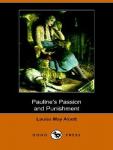
Pauline's Passion And Punishment
Louisa May Alcott
Her eyes came back from their long gaze and settled on him full of an intelligence which deepened his perplexity. "You have not learned to know me yet; death is not more inexorable or time more tireless than I. This week has seemed one of indolent delight to you. To me it has been one of constant vigilance and labor, for scarcely a look, act, or word of mine has been without effect.
-
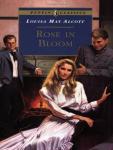
Rose In Bloom
Louisa May Alcott
Written by Louisa May Alcott, Rose in Bloom depicts the story of a nineteenth century girl, Rose Campbell, finding her way in society. Sequel to Eight Cousins.The story begins when Rose returns home from a long trip to Europe. Everyone has changed. As a joke, Rose lines up her seven cousins to take a long look at them, just as they did with her when they first met. The youngest accidentally mentions that the aunts want Rose to marry one of her cousins to keep her fortune in the family. Rose is very indignant, for she has decided ideas about what her future holds. From the beginning, she declares that she can manage her property well on her own and that she will focus on philanthropic work. Charlie has already decided she is marked out for him, with the approval of his mother.Phebe also comes home no longer the servant that Rose "adopted" but as a young lady with a cultured singing ability. Rose challenges anyone who would look down on "her Phebe", and she is readily accepted as part of the Campbell clan until Archie falls in love with her: the family feel that Archie would be marrying beneath himself. Phebe's pride and debt to the family make her wish to prove herself before she will accept Archie; so she leaves the Campbells' home and sets off to make a name for herself as a singer, to try to earn the respect of her adopted family.After some time at home, Rose has her "coming out" into society, much to her Uncle Alec's chagrin. She promises to try high society for only three months. During that time, her cousin Charlie falls in love with her and tries in various ways to woo her. Rose begins to give in to his charm, but he derails the budding romance by coming to her house, late one night, very drunk. This ruins all her respect for him and she sees how unprincipled he really is. After the three months are up, Rose begins to focus on her philanthropic projects and convinces Charlie to try to refrain from alcohol and other frivolous things, in order to win her love and respect.She tries to help Charlie overcome his bad habits with the help of her uncle, but fails. Charlie does all he can to win her heart, but in the end he succumbs, hindered by his own weak will and his constant need for acceptance by his friends. Being spoilt by his mother meant he never learned to say "no", even to himself, and his lack of discipline proves fatal: Charlie's life ends tragically in an alcohol-induced accident on the eve of his voyage to see his father and restore his good character. Although Rose never was in love with Charlie, she did have hope that he would return a better man and that they might see what relationship could develop.Several months after Charlie's death, Rose finds out that another cousin, Mac, is now in love with her. At first, never thought of him as anything but "the worm", she refuses his love; but she does declare the deepest respect for him. This gives Mac hope, and he goes to medical school, willing to work and wait for her. She finds his devotion touching, and she begins to see him clearly for the first time, realizing that Mac is the "hero" she has been looking for. He is exactly suited to her tastes and has become a man in the noblest sense of the word. He also settles a joke with her by publishing a small book of poetry to wide critical success, earning her respect even more deeply. It is his absence that shows her how much she cares for him.While Rose is discovering her heart, Steve and a minor character, Kitty, engage to marry. This creates a new sensation in the family, and Kitty begins to look to Rose for sisterly guidance. Rose encourages her to improve her silly mind, and Kitty is a very willing pupil. Rose continues to wait for Mac's return but reaches a crisis when Uncle Alec becomes very sick while visiting Mac; Phebe nurses him back from the brink of death, at personal peril, and returns him to the anxious Campbells to be greeted as a triumphant member of the family, sealing her own engagement with Archie with everyone's blessing. This homecoming is completed for Rose when she is reunited with Mac and finally declares her own sentiments. The book closes with three very happy couples, and much hope for their felicity.
-
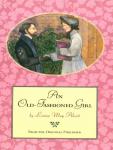
An Old-Fashioned Girl
Louisa May Alcott
An Old-Fashioned Girl is a novel by Louisa May Alcott.It was first serialised in the Merry's Museum magazine between July and August in 1869 and consisted of only six chapters. For the finished product, however, Alcott continued the story from the chapter "Six Years Afterwards" and so it ended up with nineteen chapters in all. The book revolves around Polly Milton, the old-fashioned girl who titles the story. Polly visits her wealthy friend Fanny Shaw in the city and is overwhelmed by the fashionable and urban life they live––but also left out because of her "countrified" manners and outdated clothes.The novel was the basis of a 1949 musical film starring Gloria Jean as Polly.Polly Milton, a 14-year-old country girl, visits her friend Fanny Shaw and her wealthy family in the city for the first time. Poor Polly is overwhelmed by the splendor at the Shaws' and their urbanized, fashionable lifestyles, expensive clothes and other habits she has never been exposed to, and, for the most part, dislikes. Fanny's friends reject her because of her different behavior and simple clothing, and Fan herself can't help considering her unusual sometimes. However, Polly's warmth, support and kindness eventually win the hearts of all the family members, and her old-fashioned ways teach them a lesson.Six years later, Polly comes back to the city to become a music teacher and struggles with profession issues and internal emotions. Later in the book, Polly finds out that the prosperous Shaws are on the brink of bankruptcy, and she guides them to the realization that a wholesome family life is the only thing they will ever need, not money or decoration.With the comfort of the ever helpful Polly, the family gets to change for the better and to find a happier life for all of them. After being rejected by his fiancée, Trix, Tom procures a job out West, with Polly's brother Ned, and heads off to help his family and compensate for all the money he has wasted in frivolous expenditures. At that point of the book, we see that Polly and Tom seem to have developed strong feelings for one another.At the end of the book, Tom returns from the West and finally gets engaged to his true love, Polly.
-
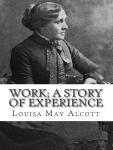
Work: A Stort Of Experience
Louisa May Alcott
Work: A Story of Experience, first published in 1873, is a semi-autobiographical novel by Louisa May Alcott, the author of Little Women, set in the times before and after the American Civil War.It is one of "several nineteenth-century novels [which] uncovers the changes in women's work in the new industrial era, as well as the dilemmas, tensions, and the meaning of that work".[1] The story depicts the struggles of a young woman trying to support herself. The main character, Christie Devon, works outside the home in a variety of different jobs, but the end of her story marks "the beginning of a new career as a voice and activist for other working women".The character David Sterling is loosely based on Alcott's friend, Henry David Thoreau.
-
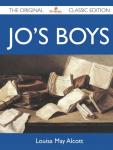
Jo's Boys
Louisa May Alcott
This is a story of how the Little Men turned out. Will Tom be able to get Nan to marry him? Or will Nan turn him down? What about Dan? Does he ever marry? And what about the Princess? Will Mrs. Meg Brooke ever let Nat marry Daisy? Read the book to find out the rest of the story! For Jos Boys, which she intended to be the last in her series about the March family, Louisa May Alcott pulled out all the stops. It is with great fanfare that the beloved characters of former books make their last appearance. All sorts of incredible developments are described in the course of the novel-and some of them fairly stretch the imagination. My favorite is the emigration of the whole extended family to Plumfield: Meg has a house close by, Laurie and Amy have a mansion on an adjacent hill, and even Mr. March and Mr. Laurence have become neighbors to the school. Of course, this and all the rest make the story more fun. The school itself has become a college-a convenient twist that allows the characters from Little Men to still be in the same area years after they ought to have moved away. Though not all the Plumfield students make a second appearance, Alcotts famous favorites remain. A decade later, Demi is having trouble deciding on a career and declaring himself to a certain young lady. Tommy is in pursuit of his childhood sweetheart, Nan, who has vowed to be a spinster for life. Nat is sent to Germany, far away from his beloved Daisy, for musical training. Emil is shipwrecked, Dan tangles with the law, and young Ted gets into scrapes worthy of his namesakes youth. There is enough lovering and spooning here to make up for the lack in Little Men, but some characters brought in for the romance are ex machina. I loved this book, but I thought that little men and little Woman were better. Perhaps it is the long times span she took writing it.
